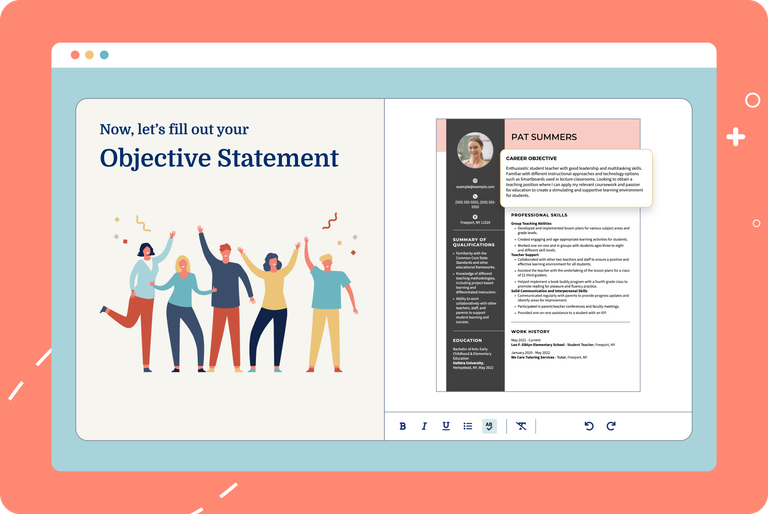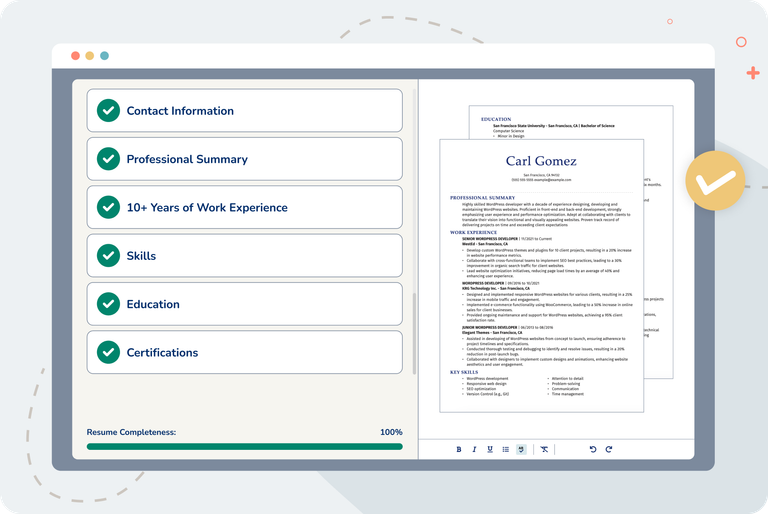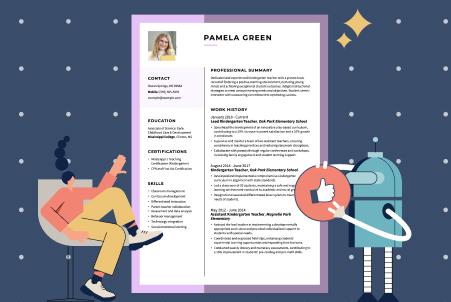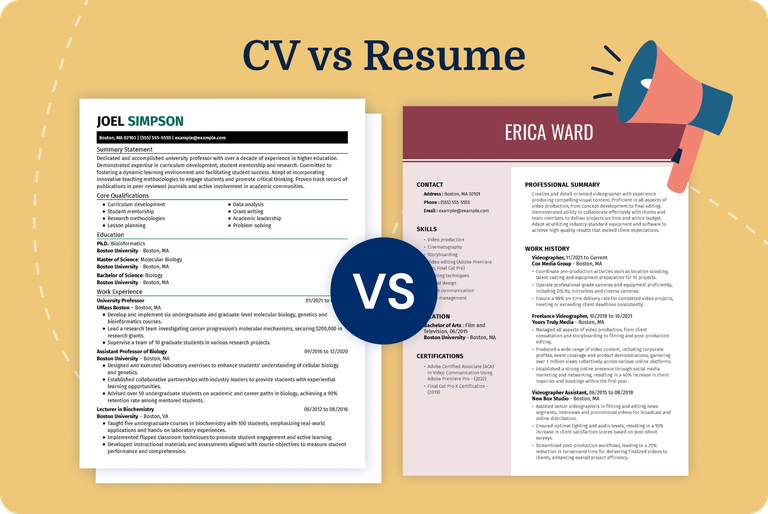Table of Contents
Get started with MyPerfectResume today!
- Build a resume on any device
- Pick an ATS-friendly template
- Tailor with AI copy suggestions
Why this resume works
- Quantifies accomplishments: Including impressive accomplishments on the resume, such as reducing client health risks by over 30%, effectively reflects the applicant’s impact and value.
- Uses action-oriented language: Using action verbs like developed, reduced, and led conveys initiative and effectiveness in previous roles.
- Illustrates problem-solving ability: By implementing dietary changes that improved client health metrics by 25%, this showcases strong problem-solving skills.
More Dietitian Resume Examples
Discover how our resume examples spotlight your nutrition expertise, patient interaction skills, and health advocacy. Tailor these samples to showcase your experience and stand out in the dietetics field.
Entry-Level Dietitian
Why this resume works
- Centers on academic background: The applicant’s education section, with a master’s degree from University of California, Berkeley, sets a solid foundation reflecting dedication to nutritional science early in their career.
- Shows research ability: Having published research in the Journal of Nutritional Science, this applicant showcases subject matter knowledge that is essential in her industry.
- Effective use of keywords: Incorporating role-relevant terms like dietary counseling and patient education reflects strategic keyword use for ATS compatibility.
Mid-Level Dietitian
Why this resume works
- Points to measurable outcomes: The applicant’s ability to achieve measurable outcomes, like boosting health by 25% and cutting costs by $20,000 annually, speaks volumes about their contributions.
- Demonstrates language abilities: Language skills such as basic Spanish and intermediate French prove that the applicant can facilitate cross-cultural communication in diverse settings.
- Displays technical expertise: With certifications like Certified Nutrition Specialist, the applicant brings notable technical expertise important for crafting dietary plans and innovative nutrition interventions.
Experienced Dietitian
Why this resume works
- Lists relevant certifications: By listing certifications such as Certified Nutrition Specialist, the applicant’s dedication to expertise and ongoing learning is evident.
- Showcases impressive accomplishments: Winning an award for best community nutrition program shows that this applicant is operating at a high level.
- Emphasizes leadership skills: Coordinating team training show the applicant is adept at collaboration as well as leadership. Both qualities are crucial for this role.
Dietitian Resume Template (Text Version)
Suki Kim
Buffalo, NY 14207
(555)555-5555
Suki.Kim@example.com
Professional Summary
Expert dietitian with 7 years enhancing health. Specialized in nutrition planning and client wellness, committed to elevating nutritional outcomes with advanced strategies.
Work History
Dietitian
Healthy Habits Clinic – Buffalo, NY
January 2022 – May 2025
- Developed 200+ personalized nutrition plans
- Reduced client health risks by over 30%
- Led workshops to educate on balanced diets
Nutrition Consultant
Wellness Solutions Group – New York, NY
January 2018 – December 2021
- Improved client health metrics by 25%
- Implemented dietary changes for 100+ clients
- Conducted surveys achieving 90% satisfaction
Clinical Dietitian
Prime Health Center – Albany, NY
June 2015 – December 2017
- Managed nutritional care for 50 patients
- Increased diet adherence by 40%
- Collaborated with teams for patient wellness
Certifications
- Certified Nutrition Specialist – American Nutrition Association
- Registered Dietitian Nutritionist – Commission on Dietetic Registration
Education
Master of Science Nutrition Science
University of California, Berkeley Berkeley, CA
May 2015
Bachelor of Science Dietetics
San Diego State University San Diego, CA
May 2013
Languages
- Spanish – Beginner (A1)
- French – Intermediate (B1)
- Mandarin – Beginner (A1)
Skills
- Nutritional Assessment
- Meal Planning
- Patient Counseling
- Health Promotion
- Dietary Guidelines
- Clinical Nutrition
- Diabetes Management
- Public Health Education
Related Resume Guides
Advice for Writing Your Dietitian Resume
Dive into our tips on how to write a resume for a dietitian position and discover ways to highlight your nutrition expertise and passion for promoting healthy lifestyles. Whether you’re just starting out or looking to advance, we’ve got tailored advice to help you stand out in the field of dietetics.
Write a strong professional summary
When creating your resume introduction, you’ll need to decide whether to include a professional summary or a resume objective.
A professional summary consists of 3-4 sentences highlighting your experience, skills, and achievements. It’s best for experienced applicants who want to showcase their professional identity and the value they bring to the role. This section is action-oriented and focuses on what you’ve accomplished so far.
On the other hand, resume objectives focus on career goals and are ideal for entry-level applicants, career changers, or those with employment gaps. While summaries highlight “what I’ve accomplished,” objectives emphasize “what I aim to contribute.”
Next, we’ll show you examples of both professional summaries and resume objectives tailored for different industries and levels of experience.
Dietitian resume summary examples
Entry-level
Recent bachelor of science in dietetics graduate with a strong foundation in nutrition science, meal planning, and dietary assessment. Certified by the Commission on Dietetic Registration (CDR) and experienced in clinical internships. Eager to apply knowledge to support patients’ nutritional needs and promote healthy eating habits.
Mid-career
Dedicated dietitian with over 5 years of experience in hospital and outpatient settings. Expertise in creating individualized nutrition plans, conducting dietary consultations, and managing chronic conditions through diet modifications. Registered dietitian licensed in New York, recognized for excellent patient rapport and successful outcomes in weight management programs.
Experienced
Seasoned dietitian specializing in pediatric nutrition and critical care with more than 15 years of experience. Holds advanced certifications in neonatal nutrition and enteral/parenteral therapy. Proven track record of leading nutrition teams, developing comprehensive dietary protocols, and improving patient recovery rates through innovative nutritional strategies. Committed to advancing clinical practice standards and mentoring emerging dietitians.
Dietitian resume objective examples
Recent graduate
Passionate and dedicated recent bachelor of science in nutrition graduate seeking an entry-level dietitian position to use academic knowledge and hands-on training in dietary planning and patient counseling. Committed to promoting healthy eating habits and improving patient wellness through evidence-based nutrition practices.
Career changer
Motivated professional transitioning into the dietetics field with a background in healthcare support and a solid understanding of nutritional science gained through coursework and volunteer experience. Eager to contribute to a clinical team by providing personalized dietary guidance and supporting patients in achieving their health goals.
Specialized training
Recent graduate with specialized training in sports nutrition seeking an entry-level dietitian role at a fitness center or sports organization. Enthusiastic about applying knowledge of performance-improving diets to help athletes optimize their nutrition for peak performance and recovery.
Want a standout resume? Use our Resume Builder to easily organize your skills and experience as a dietitian into a clean, professional format.
Include relevant certifications and training
For a dietitian, listing certifications and training is important because it shows your skills and knowledge in nutrition and health. These credentials help employers see that you are qualified to give safe dietary advice. A dedicated certifications section on your resume makes it easy for hiring managers to find this information quickly.
Here are some of the certifications we see most often on dietician resumes:
- Registered Dietitian Nutritionist (RDN)
- Certified Diabetes Educator (CDE)
- Board Certified Specialist in Sports Dietetics (CSSD)
- Certified Nutrition Support Clinician (CNSC)
- Lactation Counselor Training Program
Having these certifications can make a big difference when applying for jobs. They show that you are committed to keeping up with the latest practices in dietetics.
Example of a certifications section
Registered Dietitian Nutritionist (RDN)
Issued by: Commission on Dietetic Registration (CDR)
Issued 2020
Certified Diabetes Educator (CDE)
Issued by: Certification Board for Diabetes Care and Education
Expires 2025
Lactation Counselor Certification
Issued by: Academy of Lactation Policy and Practice (ALPP)
Issued 2023
Nutrition Support Clinician Certification (CNSC)
Issued by: American Society for Parenteral and Enteral Nutrition (ASPEN)
Expires 2024
Food Safety Manager Certification
Issued by: National Registry of Food Safety Professionals
Expires 2026
We recommend using one of our professional resume templates to easily create a polished resume that showcases your skills and qualifications.
Showcase your work experience
Showcasing work experience on your resume will help you land the job you want. Your past jobs highlight what you can bring to the table, and employers often focus on this section of your resume. It’s smart to list your jobs in reverse chronological order, starting with the most recent role. This approach lets hiring managers quickly spot your latest accomplishments and abilities.
For every position, begin with your job title, followed by the employer’s name, location, and employment dates. Use bullet points or brief sentences to outline your main duties and successes.
Highlight measurable outcomes — for instance, reducing patient wait times by 20% or creating a new meal plan that boosted client health results. Include core responsibilities like developing nutrition plans, performing dietary assessments, and hosting workshops focused on healthy eating habits.
Make sure to emphasize skills specific to being a dietitian. Talk about advising patients based on their medical needs or teaming up with other healthcare providers to improve patient care. These examples show potential employers you’re not just experienced but also skilled at applying your expertise in real-world scenarios. With this approach, you’ll present yourself as an excellent match for a dietitian role.
5 dietitian work history bullet points
- Led nutrition assessments for over 100 patients monthly, improving overall dietary adherence by 25%.
- Developed personalized meal plans that contributed to a 40% increase in patient satisfaction scores.
- Implemented a community outreach program educating 500+ individuals on nutrition, resulting in a 15% decrease in local obesity rates.
- Collaborated with healthcare teams to integrate diet therapy into treatment plans, improving recovery times by 20%.
- Streamlined record-keeping processes for dietary recommendations, reducing administrative time by 30%.
Dietitians should select a resume format that highlights their nutritional expertise, certifications, and capability to work in diverse settings.
Match your resume with the job description
Tailoring resumes to job descriptions is key because it helps job seekers stand out to employers and pass through applicant tracking systems (ATS). These systems scan for specific keywords and phrases from job postings, ensuring that only relevant applicants are considered.
An ATS-friendly resume incorporates keywords and phrases from the job description. By aligning your skills with these terms, you increase your chances of getting noticed by hiring managers who use ATS in their recruitment process.
Identifying keywords in job postings means looking for skills, qualifications, and duties mentioned repeatedly. For a dietitian role, examples might include patient care, clinical assessments, or healthcare team collaboration. Using exact phrases from the posting is important to match what ATS looks for.
To incorporate these terms naturally into your resume content, rewrite job descriptions using the identified keywords. For example, change “provide high-quality patient care” to “delivered high-quality patient care to improve overall health outcomes,” ensuring the language aligns with your experience while capturing key terms.
Targeted resumes improve ATS compatibility by increasing the likelihood that your application will be seen by hiring managers interested in candidates whose skills match those listed in the job description. Remember to customize your resume for each position you apply for to improve visibility with potential employers.
Don’t let ATS software block your next big opportunity! Use our ATS Resume Checker to make sure your resume is in the right format and has the keywords you need.
Salary Insights for Dietitians
Salary data helps people learn about job trends and what to expect in the market. The U.S. Bureau of Labor Statistics shares lots of important information. More details are provided below.
Top 10 highest-paying states for dietitians
Dietitians earn varying salaries across the United States, with a national average of $71,577. The table below highlights the states where dietitians command the highest compensation.
Our salary information comes from the U.S. Bureau of Labor Statistics’ Occupational Employment and Wage Statistics survey. This official government data provides the most comprehensive and reliable salary information for writers across all 50 states and the District of Columbia. The figures presented here reflect the May 2025 dataset, which is the most recent available as of this publication.
| State | Average Salary |
|---|---|
| California | $94,390 |
| Oregon | $86,800 |
| Connecticut | $85,190 |
| Alaska | $84,150 |
| Maryland | $84,080 |
| New Jersey | $83,080 |
| Massachusetts | $82,380 |
| Washington | $81,140 |
| Hawaii | $80,380 |
| . New York | $80,500 |
FAQ
Do I need to include a cover letter with my dietitian resume?
Yes, adding a well-crafted cover letter to your dietitian resume can really boost your application.
A cover letter lets you highlight your passion for nutrition and wellness, talk about specific experiences, and show off your communication skills.
For example, if the clinic or facility focuses on pediatric nutrition or diabetes management, you can detail your related experience or interest in those areas.
You might find it helpful to use our Cover Letter Generator to produce a personalized letter based on your resume or create one from scratch with expert advice.
Also, checking out our collection of cover letter examples can provide valuable inspiration tailored to various roles within the healthcare industry.
How long should a dietitian’s resume be?
For a dietitian, a one-page resume usually works best for showcasing key skills like nutritional assessment, client counseling, and dietary planning. This is especially true if you’ve been working for less than 10 years.
If you have extensive experience or special certifications in sports nutrition or pediatric dietetics, a two-page resume might be suitable. Ensure every detail is relevant and highlights your ability to create effective dietary programs.
How do you write a dietitian resume with no experience?
Here are a few tips for crafting a resume with no experience:
- Highlight education and credentials: Start by listing your education in nutrition or dietetics, including your school name and graduation date. Mention any relevant certifications like Registered Dietitian (RD) or Licensed Dietitian Nutritionist (LDN).
- Include internships or volunteer work: Detail any internships, volunteer roles, or projects related to nutrition. Explain what you did and learned – whether it was meal planning for a community center or assisting in a hospital dietary department.
- Showcase transferable skills: Focus on transferable skills applicable to dietetics such as communication, teamwork, and problem-solving. If you’ve worked in customer service or healthcare settings, emphasize how those experiences prepared you for working with clients.
Check out more tips on creating a strong resume without direct experience by learning from resources provided by career coaches and industry experts.
Rate this article
Dietitian
Share this page
Additional Resources

The Illusion of Wage Growth: Where Paychecks Stretch the Farthest
U.S. wages have climbed at one of the fastest rates in modern history. Between 2020 and 2024, the average American worker’s pay rose from about $64,000 to $75,600, an 18%

100+ Resume Objective Statement Examples & Best Practices
In just a sentence or two, a resume objective statement tells hiring managers the role or career path you’re aiming for and the unique skills and value you bring to

150+ Skills for a Resume: Examples for Any Job
Crafting a standout resume starts with highlighting the skills and qualifications that demonstrate your fit for the role. But in a crowded job market, knowing which abilities will actually catch

When to Use a Two Page Resume (With Examples & Formatting Tips)
If you’ve spent years building your skills, growing in your career, and racking up accomplishments, a one-page resume might not cut it. A two-page resume gives you space to present a

How to Make an ATS Friendly Resume (Templates & Guide)
In today’s fast-paced hiring climate, many employers use applicant tracking systems (ATS) to organize, store, and screen candidate information. Optimizing your resume for ATS is essential for ensuring your application passes

CV vs Resume: What’s The Difference?
Confused about the difference between a resume and a CV? You’re not alone! While both documents help you land a job, they vary in content, structure, and formatting. In this guide, we’ll
